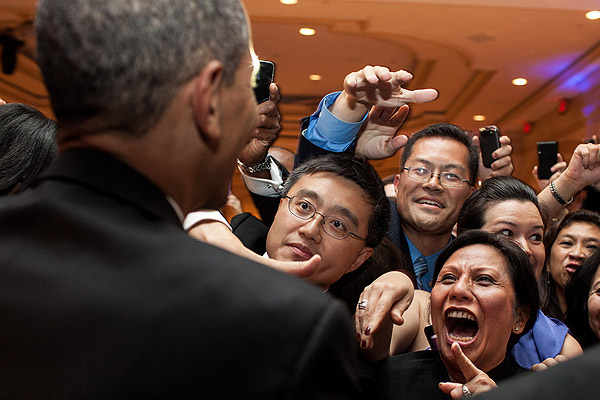
For the second year in a row, the President is celebrating his birthday at home—with a fundraiser (for $3, grassroots donors can win a chance to be a VIP). I'll grant that I have none of the temperaments required to be a pol, knowing no one less suited who is not currently imprisoned, but marking your birthday with a fundraiser seems really depressing, taking a not-vacation to dedicate your birthday to the crappy part of your job.
Then again, maybe he's just used to it. It seemed like Obama was having an awful lot of fundraisers; today he's doing two in Austin, Texas, including one with Jerry Jeff Walker, which seems cooler than one with Sarah Jessica Parker, and then "a more intimate fundraiser hosted by former Dell Inc. finance chief Tom Meredith." Last week, it was two in DC; Next week, two in the Bay area. I tend to follow weird policy stuff more closely than the Dialing for Dollars aspect of politics, but just from reading the headlines every day it seemed like Obama was doing a lot of them.
The need to raise more and more cash means the number of fundraising events has increased dramatically, according to Brendan Doherty, a political scientist at the U.S. Naval Academy and author of the new book The Rise of the President’s Permanent Campaign. As of July 9, Doherty had tracked 177 Obama fundraising appearances during the third and fourth years of his presidency. The comparable number for George W. Bush was 86, or less than half. For Bill Clinton it was 70; for George H.W. Bush, 24; and for Jimmy Carter, 25. Ronald Reagan’s total in 1983-84: three.
He's outraised Romney so far, $552 million to $394 million, but that's attributable to Romney's late start. Since becoming the nominee, Romney has far outpaced Obama, and there's more where that came from. If he surpasses Obama, he'll be the first challenger to out-fundraise a sitting president. Romney was most recently in Jackson, Mississippi, hosting a fundraiser that turned into Downton Abbey:
Addressing 300 contributors at a Jackson, Miss., fundraiser who paid $2,500, $10,000 or $50,000 to hear him speak, Romney acknowledged that the people in the room were well-off compared to many Americans. It was the middle class that had been let down by Obama, Romney said, and he pointed to the wait staff serving finger foods as an example.
The spectacular amounts of money being spent on political campaigns, on advertising that no one likes and only works at the margins, always have political scientists and pundits cautioning candidates that, at a certain point, the return on investment becomes zero. (I haven't lived in a swing state during a presidential election, but my impression from Wisconsinite friends is that by November most people have reached catatonia.) Which has made me think that this time, people will realize the madness of having a sitting president hosting more than a fundraiser a week and will moderate their ad budgets, and pursuit of dollars, accordingly. But no one knows where that money horizon is, and there's substantial evidence of two things: frequency of advertising matters, and the effect of ads doesn't last very long. In that sense, it's like a drug, which is a big reason why campaign spending has followed an addict's arc:
Consider the 2000 presidential election. In the final two weeks of the campaign, residents in battleground state were twice as likely to see a Bush ad as a Gore ad. This cost Gore 4 points among uncommitted voters. The same thing happened in 2008, when Mr. Obama vastly outspent his Republican opponent, Senator John McCain. According to some research, in counties where Mr. Obama broadcast 2,000 more ads than Mr. McCain, he received about 1 percentage point more of the vote than John Kerry did in those same counties in 2004…. But the ultimate point is this: if the 2012 race is close, do not pay attention to every subtle or even subliminal message in the ads. Just look to see who is spending more.
A study released last month by b-school profs at Stanford and Columbia found that, all other things being equal, Bush's advertising swung three states in 2000 from Al Gore.
If there's any hope for moderating campaign spending, it's this (emphsis mine), such as it is:
The fact that opinion equilibrates quickly in the wake of a televised ad campaign such as the one studied here underscores the potential costliness of waging a battle for votes on TV. The immediate effect of a televised ad campaign makes it a cost-effective option in the short run. To shift opinion 5 percentage points among an electorate of 14 million people means persuading 700,000 voters. To expose the electorate to 1,000 GRPs of television at a rough average cost of $150 per point amounts to approximately $3 million per week. At less than $5 per vote, this expenditure is a bargain, but the difficulty is that there is little to show for one’s money a week or two later.
In short, TV ads are effective for about a week or two, and then their effect—both conscious and subconscious—vanishes. Perhaps in the future a cost-conscious candidate will take these lessons to their limit, leaving us alone during the silly season and following up with a barrage of imagery like something out of A Clockwork Orange.
Photograph: The White House


